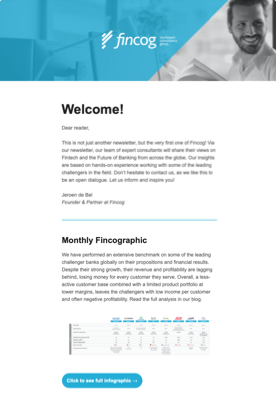Are traditional banks becoming a thing of the past? With the rapid evolution of technology, the financial industry has undergone a seismic shift, putting increased pressure on banks to adapt or risk losing market share. In addition to macroeconomic trends, new players and technological innovations are reshaping the environment in which banks operate.
But what does this mean for traditional banks? In our recently published report 'Banking for Tomorrow,' we explore the latest innovations in financial technology, the challenges incumbents are facing, and how they can respond to increasing competition and innovative offerings. From the rise of digital banks to the pressure on incumbents to adapt, this article will take a deep dive into the transformation taking place in the financial industry. Whether you're a customer or an industry insider, this is a must-read for anyone who wants to stay on top of the latest trends in finance.
Digital evolution
Digital innovations continue to define the market. While in the early days ‘online life’ was separate and rather segmented across platforms, online is now merging with offline and advancing to web 3.0, utilizing the full potential of data to define customer experience. Retailers provide more personalized physical experience, leveraging customer location and online behaviour to tailor client offers and discounts via apps and in-store. Physical check-outs are being replaced by digital solutions; for example, viewing the menu, placing your order, and paying via a QR code is now commonplace in many restaurants. And while Web 2.0 was defined by a shift from desktop computer to mobile phone, from local storage to the cloud and data controlled by BigTech, Web 3.0 marks the shift to a decentralized, open-source, token-based digital economy that is managed by a community.
Ecosystem Transformation
As the market changes, so do financial service providers. Technological advances are unbundling the value chain with a swath of new technology and Banking-as-a-Service (BAAS) providers. Fintech startups are focusing on specific product segments and niches, offering better customer experience and more efficient operating models than traditional banks. White label solutions offer fully integrated financial services that clients can run under the umbrella of their own brand via APIs, adding new and enriching existing services. These can cover everything from regulatory licensing to operations and certain product features. While estimates vary widely, most experts agree on the future growth potential of the global BAAS market.
Collaboration seems to be the best way forward and banks must be supportive to clients that are looking for solutions outside their own organization. Banks can outsource the latest technology and operate on top of an external provider – which can be applied to both non-core initiatives in new markets, as well as to larger initiatives in the core business. Furthermore, BAAS offers banks a new distribution channel for their products, whether to source new deposits, issue loans, tap into revenue streams or for banks that are struggling to compete on the customer relationship, in which case the fintech client provides the digital front end. To leverage opportunities, banks need a dynamic, open API and platform-based approach that enables banking products to be offered and consumed, as a service, at scale.
Open Finance
Open Banking is one of the key regulatory reforms pushed across the globe. The possible applications of open banking are plentiful and could affect anything financial institutions do in the customer relationship, whether they’re looking to enrich their existing financial services or provide their capabilities as a utility in a white label fashion to third parties (in the context of BAAS and embedded finance).
As open banking matures, it is gradually evolving into embedded finance, whereby services migrate to outside of the mobile banking app and online banking portal. This allows the creation of intuitive customer journeys in which financial services become nearly invisible to the user as part of the customer journey. Companies are looking to leverage opportunities and explore new business models by deploying embedded finance capabilities, whether that is to authorize access to credit records to prove affordability of a loan, to issue insurance based on transaction data, or to offer a loyalty point scheme. Conceptually these are not inherently new solutions, but what has changed is that open banking has provided the infrastructure and tools to create a fully integrated service.
Staying ahead of the game
The pandemic and geopolitical turmoil have led to inflation, rising interest rates and a more fragile economy that in the recent month have put many banks in a precarious position. However, challenges don’t end there. Banks are now part of a broader, more diverse, and more complex ecosystem with a blurring of lines between industries and new players being introduced to the market.
Banks must act quickly and decisively to remain competitive and maintain their market position. The need to transform and innovate has never been greater for incumbents to stay relevant and thrive in the new era of banking. The future of the industry belongs to those who can adapt and leverage the power of technology to deliver customer-centric solutions that meet the needs of today's consumers.
How Fincog can help
Fincog is one of the leading strategy consulting firms in digital banking supporting its clients to benefit from financial innovations through a variety of services including the definition of forward-looking fintech strategies, innovating product portfolios or optimizing operations.
To find out how your organization can tackle this changing landscape contact us directly at info@fincog.nl so we can provide you with dedicated support.


